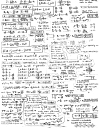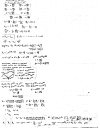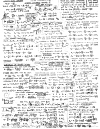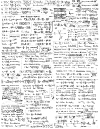Electromagnetic Fields and Waves
In college I enrolled in an
electrical engineering course called Electromagnetic Fields and
Waves, taught by John Whinnery and Ted Van Duzer, who also wrote
the textbook used in the class.
At final exam time, each student was allowed to bring in one letter-size sheet of notes, containing whatever the student cared to write on both sides. Side 1 of my sheet is shown below. (Click here to see the other side.)
At final exam time, each student was allowed to bring in one letter-size sheet of notes, containing whatever the student cared to write on both sides. Side 1 of my sheet is shown below. (Click here to see the other side.)
A note to those of you who are
studying for your exam on electromagnetic fields and waves --
The real value of these notes came from the studying and
reviewing that you do when you write them, not from actually
having the notes available during the exam. To make your own
notes, go through the textbook and homework problems and write
down the relevant formulas. Work through the example problems
and be sure that you understand them. Try a few problems that
haven't done before, and get some help if you run into
difficulty. If you have enough space, write down some sample
problems and how to solve them. The notes should help jog your
memory during the exam. You cannot expect to figure out how to
use the formulas during the exam.
These notes are for the 1970s edition of the book, now called Fields and Waves in Communication Electronics. Maxwell's equations are still in effect, but the applications may have changed since I was in college. In the 1970s, the book was heavy on radar wave guides and transmission lines.
Downloadable and printable TIFF
files (340 K each):
 EECS-117A Side 1 |
 EECS-117A Side 2 |
 EECS-117B Side 1 |
 EECS-117B Side 2 |
These notes are for the 1970s edition of the book, now called Fields and Waves in Communication Electronics. Maxwell's equations are still in effect, but the applications may have changed since I was in college. In the 1970s, the book was heavy on radar wave guides and transmission lines.